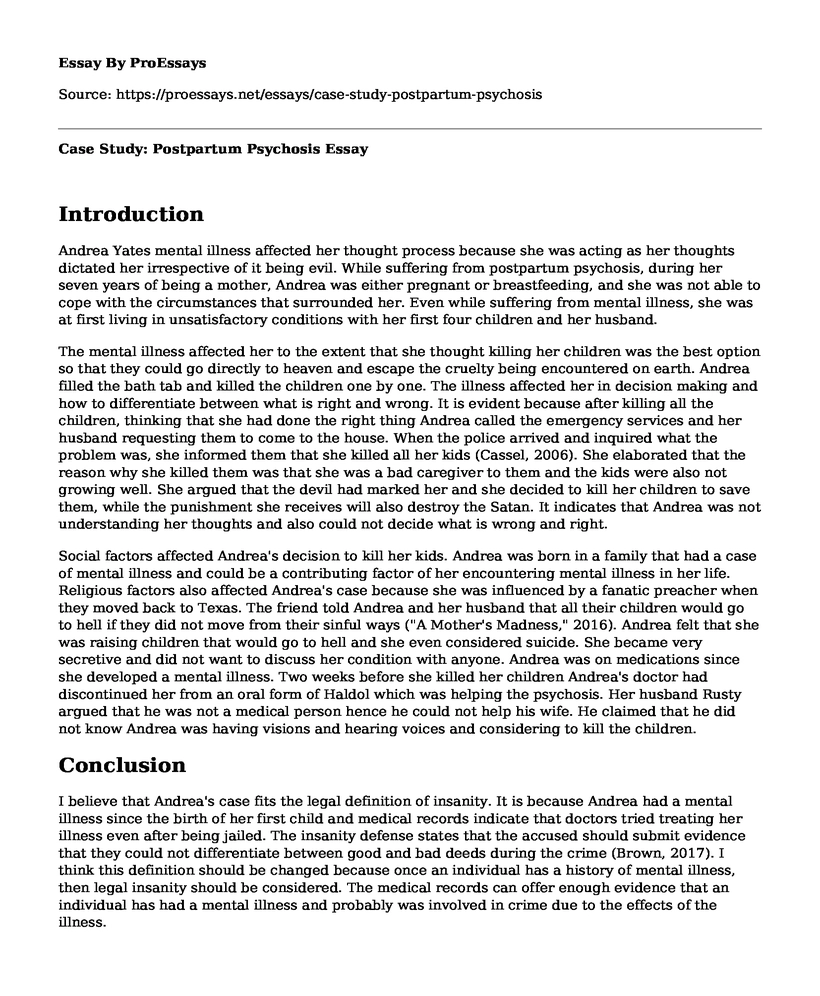Introduction
Andrea Yates mental illness affected her thought process because she was acting as her thoughts dictated her irrespective of it being evil. While suffering from postpartum psychosis, during her seven years of being a mother, Andrea was either pregnant or breastfeeding, and she was not able to cope with the circumstances that surrounded her. Even while suffering from mental illness, she was at first living in unsatisfactory conditions with her first four children and her husband.
The mental illness affected her to the extent that she thought killing her children was the best option so that they could go directly to heaven and escape the cruelty being encountered on earth. Andrea filled the bath tab and killed the children one by one. The illness affected her in decision making and how to differentiate between what is right and wrong. It is evident because after killing all the children, thinking that she had done the right thing Andrea called the emergency services and her husband requesting them to come to the house. When the police arrived and inquired what the problem was, she informed them that she killed all her kids (Cassel, 2006). She elaborated that the reason why she killed them was that she was a bad caregiver to them and the kids were also not growing well. She argued that the devil had marked her and she decided to kill her children to save them, while the punishment she receives will also destroy the Satan. It indicates that Andrea was not understanding her thoughts and also could not decide what is wrong and right.
Social factors affected Andrea's decision to kill her kids. Andrea was born in a family that had a case of mental illness and could be a contributing factor of her encountering mental illness in her life. Religious factors also affected Andrea's case because she was influenced by a fanatic preacher when they moved back to Texas. The friend told Andrea and her husband that all their children would go to hell if they did not move from their sinful ways ("A Mother's Madness," 2016). Andrea felt that she was raising children that would go to hell and she even considered suicide. She became very secretive and did not want to discuss her condition with anyone. Andrea was on medications since she developed a mental illness. Two weeks before she killed her children Andrea's doctor had discontinued her from an oral form of Haldol which was helping the psychosis. Her husband Rusty argued that he was not a medical person hence he could not help his wife. He claimed that he did not know Andrea was having visions and hearing voices and considering to kill the children.
Conclusion
I believe that Andrea's case fits the legal definition of insanity. It is because Andrea had a mental illness since the birth of her first child and medical records indicate that doctors tried treating her illness even after being jailed. The insanity defense states that the accused should submit evidence that they could not differentiate between good and bad deeds during the crime (Brown, 2017). I think this definition should be changed because once an individual has a history of mental illness, then legal insanity should be considered. The medical records can offer enough evidence that an individual has had a mental illness and probably was involved in crime due to the effects of the illness.
References
A Mother's Madness | Andrea Yates Documentary. (2016). YouTube. Retrieved 24 March 2018,
from https://www.youtube.com/watch?v=vANWPV-PttI&feature=youtu.be
Brown J. M. (2017). State Supreme Court Limits Use of "Insanity Defense." Michael J Brown
Texas Criminal Lawyer.
Cassel, E. (2006). The Second Andrea Yates Verdict. Www.counterpunch.org. Retrieved 24 March 2018, from https://www.counterpunch.org/2006/07/28/the-second-andrea-yates-verdict/
Cite this page
Case Study: Postpartum Psychosis. (2022, Apr 12). Retrieved from https://proessays.net/essays/case-study-postpartum-psychosis
If you are the original author of this essay and no longer wish to have it published on the ProEssays website, please click below to request its removal:
- 13 Reasons Why Critical Essay
- Dealing With Grief and Loss Essay Example
- Effectiveness of Public Awareness Education in Reducing Stigma in the UK Paper Example
- Essay Sample on Memory Strategies
- Essay Example on Cognitive Development: Piaget's Stages of Growth in Children
- Essay on Achieving Inner Peace and Happiness: Dalai Lama's Arts of Happiness
- Essay Sample on Aging: A Global Journey of Cumbersome Dynamics and Respect







